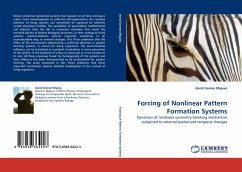Nature comprises dynamical systems that operate on all time and space scales. From morphogenesis to collective self-organization, the complex behavior of living systems can sometimes be captured by relatively simple dynamical models. The availability of quantitative mathematical and physical tools has led to numerous examples that reveal the essential physics of diverse biological processes. In clear analogy to living systems, reaction-difusion systems responds, sometimes in an unpredicatable way, to external changes. This Thesis addresses that the effect of the environment determining a preferred direction in pattern forming systems, is crucial for living organisms. The environmental influence can be translated as a periodic modulation in some parameter of the system, in the existence of a flow of chemicals or a net increase of its size. All these processes break the homogeneity of the systems and their influence has been demonstrated to be fundamental for pattern forming. The study presented in this Thesis evidences that these important parameters deserve detailed investigation in the context of living organisms.
Hinweis: Dieser Artikel kann nur an eine deutsche Lieferadresse ausgeliefert werden.
Hinweis: Dieser Artikel kann nur an eine deutsche Lieferadresse ausgeliefert werden.

